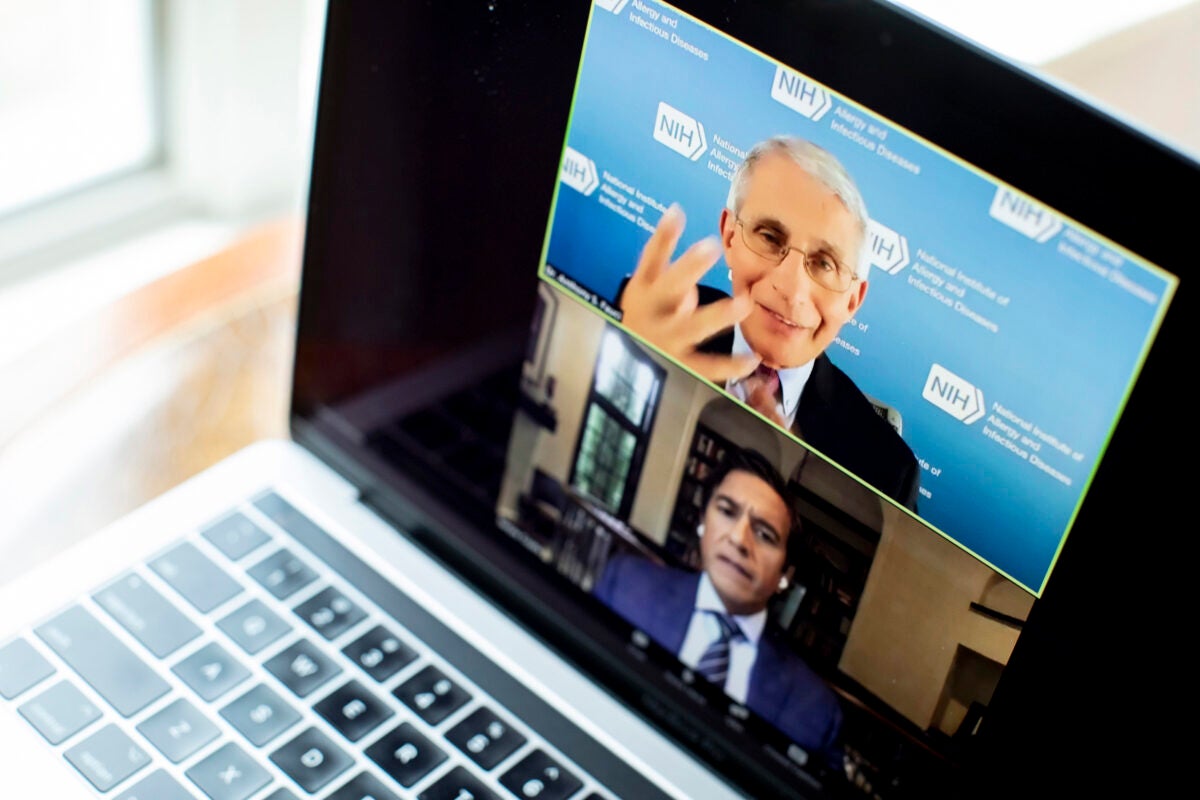Sina Schuldt/AP photo
Health
Gambling problems are mushrooming. Panel says we need to act now.
With recent leap in legalized sports betting and online options, public health experts outline therapeutic, legislative strategies
Problems with gambling issues have surged over the past half-dozen years with the rise of legalized sports betting and 24-hour online casino games. It’s gotten to the point where some researchers say something needs to be done now — and there are remedies.
That was the conclusion of a panel of public health and gambling experts gathered at a Zoom panel moderated by WBZ-TV journalist Laura Haefeli and hosted by the Studio at the Harvard T.H. Chan School of Public Health.
Betting on the election, stocks, and more has become common, said Timothy Fong, co-director of UCLA Problem Gambling Studies Program. Although gambling has been “part of human behavior for hundreds of thousands of years,” said Fong, this new surge “is not only endemic … it has changed the fabric of our bodies and our minds.”
A confluence of the gambling, technology, and financial industries has made this possible, added Shekhar Saxena, a Chan School adjunct professor of global mental health. “Tech makes sure the experience is seamless; the gambling industry make it tantalizing; and the financial industry makes it possible to put your money in with just a click or a tap,” he said. The combination “makes it more dangerous.”
Currently sports betting in casinos or racetracks is legal in 38 states and Washington, D.C., and at least 27 of those allow wagers online. Experts date the proliferation to a 2018 Supreme Court decision that struck down a federal law banning legalized sports betting in most states.
In addition, seven states allow online casino games and one other, Nevada, permits poker.
2.5 million
Americans have severe gambling problems, according to the National Council on Problem Gambling
The National Council on Problem Gambling estimates that about 2.5 million adults in the U.S. have severe problems and another 5 to 8 million have significant issues. And the dilemma may be getting worse, as gambling addiction hotlines have noted a rise in calls, and the age of callers is skewing younger.
Industries, particularly sports betting, are targeting young people, said Lia Nower, director of the Center for Gambling Studies and co-director of the Addiction Counselor Training Certificate Program at the Rutgers University School of Social Work.
“The groups most at risk are emerging adults and adolescents,” she said. Citing an upcoming study, the school’s associate dean for research noted how various workarounds, such as framing gambling as “sweepstakes,” help the industry evade age restrictions to lure new and younger gamblers.
Other well-known risk factors include low education and low economic status, said Victor Ortiz, director of the Massachusetts Office of Problem Gambling Services. That, however, is changing. Increasingly, he explained, “What we are seeing is that people with higher economic status and higher education are now at risk. We’re getting calls from people in significant distress who are not our typical callers.”
The problem, said the experts, is exacerbated by the constant availability of online gaming. Nower summoned an image of people “lying in bed [gambling] while their partners are asleep.”
“Online gambling is a public health issue and requires a public health strategy,” Ortiz said.
For starters, Fong said, recasting problems as a “gambling disorder” is a necessary step toward addressing it. Making clear that it is a mental health disorder with biological, psychological, and social components, he continued, helps alleviate the shame often attached to those unable to control their gambling.
This also helps the public understand that, as with other such disorders, medication and psychotherapy can help and can reconnect the sufferer with their family and community. “When you come into treatment,” he said, “you are going to do a lot better.”
“We need a federal presence like we have for cigarettes, alcohol, and other forms of addiction.”
Lia Nower, Center for Gambling Studies, Rutgers University School of Social Work
Enacting legislation to address the problem is the next step, experts agree.
“We need a federal presence like we have for cigarettes, alcohol, and other forms of addiction,” said Nower. Specifically, she noted the need for legislation that mandates online apps have an “opt out” system for various controls.
Right now users must specifically request to opt in to access controls that will automatically limit factors such as how much time they spend in the app and how much money they can spend. That setting should be the default, she said.
The recent surge in online gambling has left researchers, public health officials, and legislators playing catch-up.
“We don’t have advocacy groups and, unlike with substances, no one is tracking gambling-related health problems, gambling-related suicides, so we don’t have the public health data like we had with alcohol, like we had with cigarettes,” noted Nower. “And there’s a lot of shame, so families aren’t coming forward.”
“Responsible gambling is something that companies love to talk about,” added Saxena. “That puts the responsibility on the individual.”
This is especially problematic because of the shame surrounding gambling disorder, he explained. Framing the issue as one of public health instead of one of self-control involves “talking about the environment, the kind of incentives that are there.”
“Yes, people have some responsibility, but it’s the environment — the tech environment, the social environment, and the economic environment in which people live — that is important,” he stressed.














